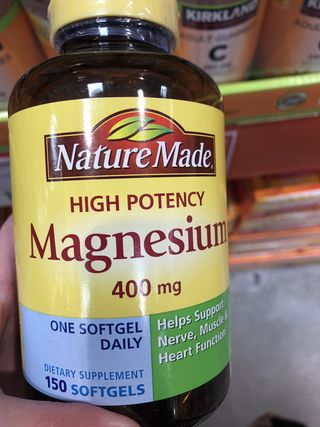Depression
Magnesium for Depression
A controlled study of magnesium shows clinically significant improvement.
Posted January 28, 2018 Reviewed by Kaja Perina

Magnesium is one of the most important minerals in the body. Years ago, I wrote about the importance of magnesium for the brain; it remains my most read blog post to this day.
We get most of our magnesium from plants (almonds, black beans, cashews, pumpkin seeds, and dark chocolate are all good sources), but it’s the bacteria in the soils that enable plants to absorb magnesium, so all sorts of environmental influences can deplete magnesium in our food, from pesticides that kill off bacteria to potassium-based fertilizers (can be taken up by plants in lieu of magnesium and calcium). Food processing, antacids, diuretics, caffeine, and alcohol can also decrease magnesium absorption. For these reasons, the modern human tends to need more magnesium and get less, leaving a lot of people chronically depleted. Blood levels remain fairly stable, because without magnesium in a narrow range, the heart can stop beating…every ICU doctor checks magnesium levels on patients pretty much every day, and repletes magnesium levels by the bag full to keep up with a patients’ needs under such intense stress as a critical illness.
Increased stress increases magnesium loss (as described here), and the environment may not readily replace it. Since magnesium is such an important mineral to the brain as a part of almost every part of the stress response, recovery, and repair, it seems self-evident to study magnesium as how it relates to brain function and common stress-related ailments such as clinical depression. Small studies have been found to be helpful for folks with fibromyalgia and major depression and type II diabetes. However, most of the studies that have been done are, admittedly, terrible.
The major flaw in most studies is they used insufficient amounts of magnesium oxide. On the face of it, magnesium oxide is about 60% elemental magnesium, which sounds pretty good. However, it is also a very stable compound, so often doesn’t disassociate into the parent compounds and give you the free magnesium you need.

Therefore, out of a 250mg tablet, you might only absorb 6mg. Magnesium malate is only 6.5% magnesium, but almost all of that is available to be absorbed. Magnesium citrate is also highly absorbable and 16% bioavailable. However, it is more likely than the other formulations to cause diarrhea. For a recent and much improved clinical trial of magnesium for depression, the researchers decided to use magnesium chloride.
The full text of the paper is free online at PLOS One. First the flaws: it was not double blinded, placebo controlled. Folks knew whether they were taking magnesium or not. However, the researchers did employ a crossover design as a control. In the first weeks of the study, half the patients took magnesium chloride (12% elemental magnesium and pretty much 100% bioavailable), and then in the second phase of the study, the first half was switched off magnesium while the other half of the patients took the supplement. The study wasn’t huge, but it wasn’t small either, with 126 depressed participants. The scale used to measure depression is my personal favorite, the PHQ9, and the average score was just over 10, which corresponds to a moderate depression. Some patients were on meds, others in therapy, some in neither, but the main key is that other treatments for depression did not change in the course of the study…magnesium chloride was added.
Participants were given 2000mg (248mg of elemental magnesium) daily for 6 weeks on an immediate or delayed (until week 7, the crossover) schedule. Depression scores on average over the trial dropped by 6 points, which brought the mean from moderately depressed to mild or minimally depressed, a clinically important change. Anxiety scores also improved. Participants reported reduced muscle cramps, aches and pains, constipation, and decreased headaches during the magnesium trial (all of these are known already to improve with magnesium supplementation and are signs of magnesium depletion). When asked after the trial if they would continue magnesium, over 60% said yes. Those that didn’t complained that magnesium didn’t help or it caused diarrhea (n = 8).
The positive effect of magnesium supplementation was gone within 2 weeks of stopping the supplement, indicating a relatively quick clearance.
Important notes:
Although the association between magnesium and depression is well documented, the mechanism is unknown. However, magnesium plays a role in many of the pathways, enzymes, hormones, and neurotransmitters involved in mood regulation. It is a calcium antagonist and voltage-dependent blocker of the N-methyl-D-aspartate channel which regulates the flow of calcium into the neuron. In low magnesium states, high levels of calcium and glutamate may deregulate synaptic function, resulting in depression. Depression and magnesium are also both associated with systemic inflammation. The finding that those participants taking an SSRI experienced an even greater positive effect points toward magnesium’s possible role in augmenting the effect of antidepressants.

So…it would have been nice to have a blinded study. However, magnesium supplementation is both inexpensive and pretty safe. The amount of magnesium in this trial was below the recommended daily allowance of elemental magnesium, and as long as you have normal kidneys, it’s difficult to take too much (diarrhea tends to limit outrageous usage). Magnesium can interfere with some medications and vice-versa, so check my old post for that info. For depression and constipation or headaches or restless legs or fibromyalgia, it makes sense to at least try magnesium for a few weeks. Those who prefer not to supplement can be encouraged to add nuts, seeds, and dark chocolate (a palatable and healthy prescription).
In the meantime, keep an eye on PubMed, because the studies are (slowly) getting better!
Copyright Emily Deans MD


